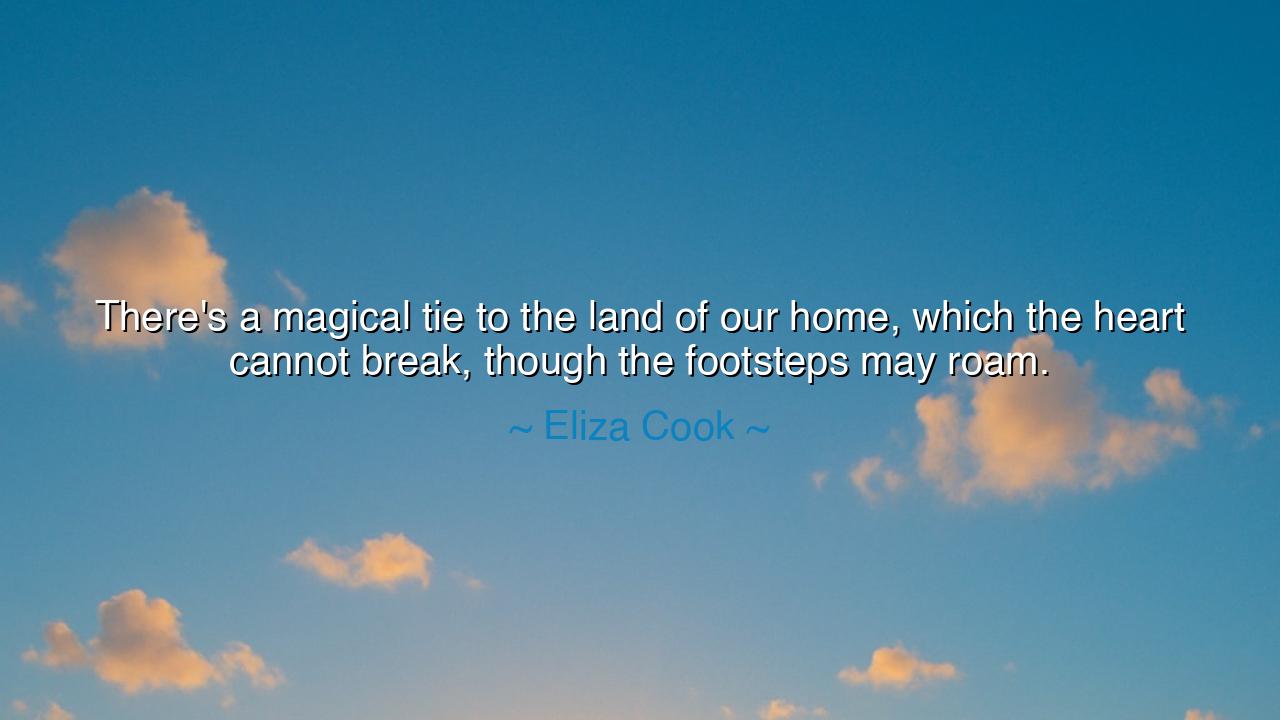
There's a magical tie to the land of our home, which the heart
There's a magical tie to the land of our home, which the heart cannot break, though the footsteps may roam.






The English poet Eliza Cook once wrote, “There’s a magical tie to the land of our home, which the heart cannot break, though the footsteps may roam.”
In these tender and immortal words, she speaks of the bond between the soul and the soil — that invisible thread that ties us to the place of our beginnings, to the land that first cradled our dreams and sorrows. It is a truth as old as humanity itself: that no matter how far we wander, the spirit of home remains within us, echoing like a familiar song across the distances of time and space. Even when our footsteps roam, our hearts, like loyal sentinels, remain rooted to the earth that shaped us.
The origin of this quote lies in the 19th century, when Eliza Cook wrote poems of heart and homeland, of love and labor, for the ordinary people of England. Hers was a voice that celebrated the simple, enduring truths of human life. In her time, industrialization was uprooting families, scattering communities, and transforming rural landscapes into cities of smoke and steel. Amidst that restless age, Cook’s verse offered a reminder: that while men might move, memory and affection bind them eternally to the soil from which they sprang. To love one’s homeland, she implied, is not mere sentiment — it is an instinct, a sacred inheritance that anchors the soul.
Indeed, the ancients too spoke of this magical tie to the land. The Greeks believed that each region was protected by its own spirit, its genius loci, the divine guardian of place. The Hebrews called their homeland the Promised Land, a covenant between earth and spirit. And even in exile, their poets wept by the rivers of Babylon, asking, “How shall we sing the Lord’s song in a strange land?” Across every culture, this truth resounds: the heart does not forget where it first learned to love, to struggle, and to hope. The bond to one’s homeland is not built of borders or ownership — it is woven from the soil’s memory of our footsteps and the air’s remembrance of our breath.
Consider the story of Mahatma Gandhi, who, though educated in England and revered across the world, never ceased to draw strength from the soil of India. When he returned to his homeland after years abroad, he said that the scent of the Indian earth filled his heart with purpose. It was this connection — the spiritual pull of home — that gave him courage to lead his people toward freedom. Even when imprisoned, he would take handfuls of Indian soil and press them to his forehead, as though touching the essence of his identity. His love for the land was not political, but sacred; it was the same tie of which Eliza Cook wrote — the eternal connection between heart and homeland.
The meaning of Cook’s words, however, extends beyond the literal earth. For home is not always the land beneath our feet; it can also be the people, the memories, the values that have shaped our inner world. Even those driven far from their native soil — by war, migration, or destiny — carry home within them like a lamp that never extinguishes. A refugee who remembers the scent of her mother’s cooking, a sailor who dreams of his village by the sea, a child of the diaspora who learns the songs of his ancestors — all are proof of this unbreakable tie. For though the footsteps may roam, the heart remains faithful to its origins.
Yet Cook’s wisdom is not only about remembrance; it is also about gratitude. She teaches that we must cherish the ground that raised us — not only in nostalgia, but in stewardship. To love one’s land is to honor it, to keep it pure, to protect it for future generations. The ancients revered the earth as Mother, and those who forgot her kindness invited ruin. Thus, even as we wander, we must remember the duty owed to our birthplace: to give back what it gave us, and to walk gently upon its soil, knowing it holds the bones and dreams of those who came before.
So, my child of many journeys, take this lesson to heart: never forget the land that gave you your first breath. You may travel far, you may build new homes, but always return — if not in body, then in spirit. Let gratitude be your compass and memory your hearth. When the world feels vast and uncertain, close your eyes and recall the earth of your beginning — the trees that once shaded you, the voices that once called your name, the sky that first taught you wonder. That remembrance will steady your soul, for it is the oldest magic of all: the tie between heart and home, unbroken across the miles of a lifetime.
And thus, as Eliza Cook reminds us, even when we wander far and wide, the truest part of ourselves remains where our story began. Home is the circle that never closes, the soil that never forgets, the love that endures even as we roam. To remember it is to know who we are; to honor it is to live with roots, no matter how far our wings may carry us.






AAdministratorAdministrator
Welcome, honored guests. Please leave a comment, we will respond soon